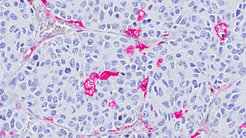
Press Page Peter Murray
The Immunoregulation group led by Peter Murray began in spring 2017. The Murray group focuses on the cellular and molecular networks that govern how the immune system is activated and deactivated, and how the basic knowledge that originates from these pathways can be applied to understanding diverse cellular systems such as tissue regeneration and wound healing.

Most organisms have simple immune systems. For example, plants lack specialized circulating immune cells. Instead plants, like bacteria, have in-built detection systems to determine if they are invaded with pathogens. Invertebrates like insects or octopuses have specialized phagocytic cells that can migrate to sites of injury and invasion, but use a few types of broad response mechanisms to cover many types of pathogens. By contrast, mammals have elaborate immune systems that have the potential to recognize and respond to any chemical entity, which are called ‘antigens’. An antigen can be anything, from components of our own bodies, food, things we breathe in, and obviously parts of invading pathogens like viruses or bacteria. The immune system has to decide what to respond to, and how to respond. In many diseases, the response is insufficient (chronic infection), attacks our own tissues (autoimmune diseases), or is uncontrolled and causes collateral damage (sepsis). The central question of immunology is how the immune response makes the right or wrong decisions: this is the research area of our focus.
A key event in the evolution of mammalian immunity was the acquisition of rearranging antigen receptors in lymphocytes (T and B cells), which allow mammals to detect almost any type of molecule by antibodies made by B cells, or through the T cell receptor (TCR) on T cells. However, the advantages of having rearranging antigen receptors are offset by two penalties: first, the danger of self-reactivity against our own molecules, cells and tissues is always present, and must be suppressed throughout life. All autoimmune diseases are failures to suppress self-reactivity. Second, complex immune systems, once acquired, became essential for life. This is best shown by the numerous germline mutations that affect T or B cell development and function (e.g. ‘The boy in the bubble’ type syndromes), which lead to early death from infection without medical intervention. Thus, understanding advanced immune responses involves intrinsic complexity not found in insect or arthropod immune systems. Experimental approaches must therefore anticipate complexity, especially at the level of in vivo interrogation of immunity.
The focus of the Immunoregulation group is how the complex interplays of cells and molecules are coordinated to respond to invading pathogens and damage, and at the same time avoid self-reactivity. This puzzle has perplexed and fascinated biologists since Paul Ehrlich originally proposed in the early 20th century that complex immune systems must somehow avoid ‘horror autotoxicus’ or self-reactivity. Over the last two decades many advances have delineated pathways that control immune networks and how the different cell types and pathways can be manipulated. A good example is the use of immune checkpoint inhibitors in cancer therapy. Immune checkpoint molecules like PD-1 and its ligands (PD-L1 and PD-L2) or CTLA4 are cell surface proteins that naturally provide ‘stop’ signals to T cells. In infection, these molecules are part of communication networks that help the immune system avoid self-reactivity once the danger of infection has passed. In cancer however, tumor cells are a type of ‘self’ and are therefore difficult to eliminate. In fact, tumors and some types of immune cells that populate tumors actively suppress T cell responses as part of their normal process of blocking horror autotoxicus. In cancer therapy however, a T cell response to the tumor is desirable. Checkpoint inhibitors work by temporarily blocking a ‘stop’ signal, and allowing T cells to continue to survey tumor tissue and potentially recognize it as ‘foreign’ or damaged.
Our work is directed at fundamental discoveries about the immune system, but in performing this research, practical insights for human health are, and we hope will be, unearthed.

